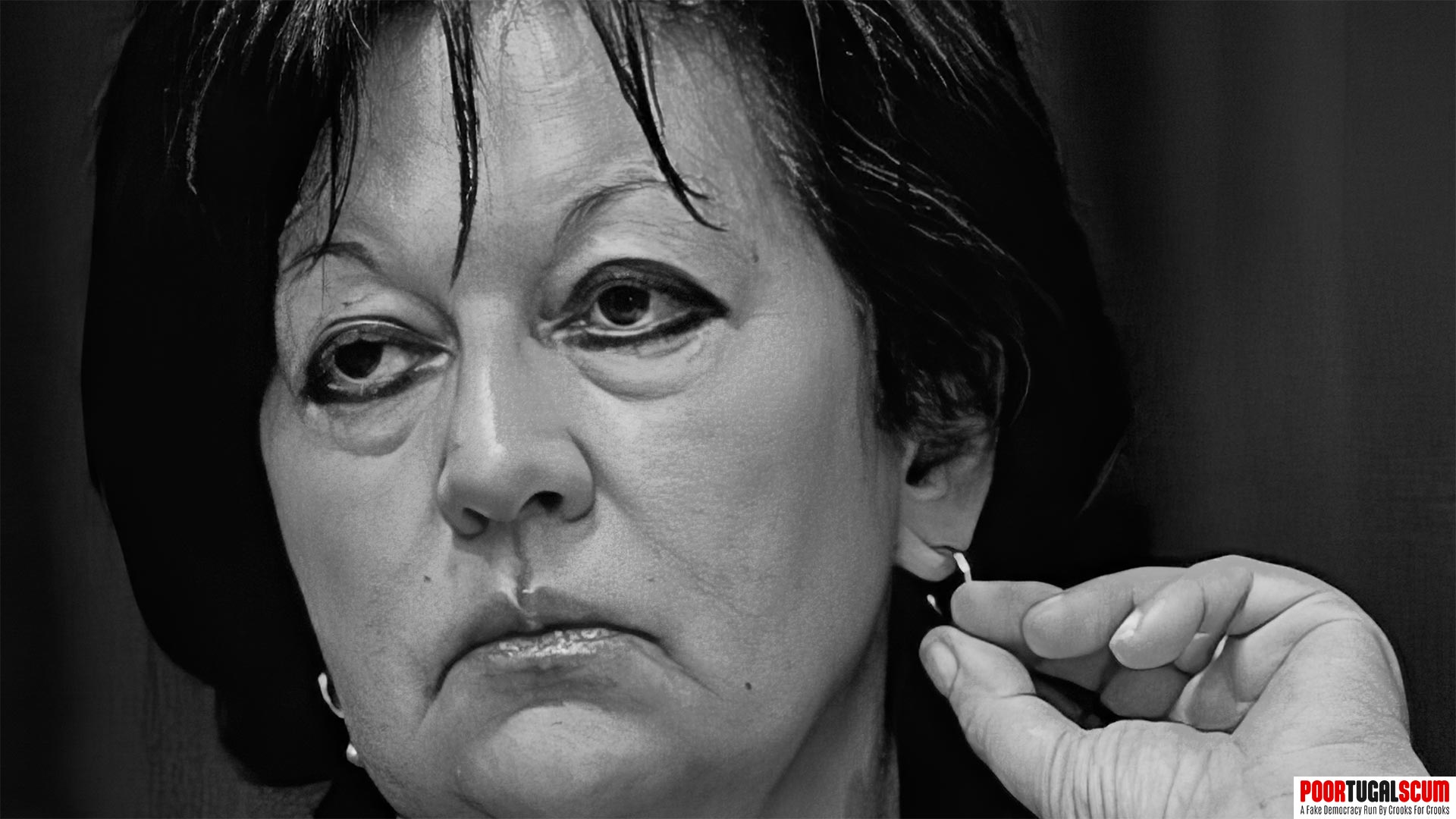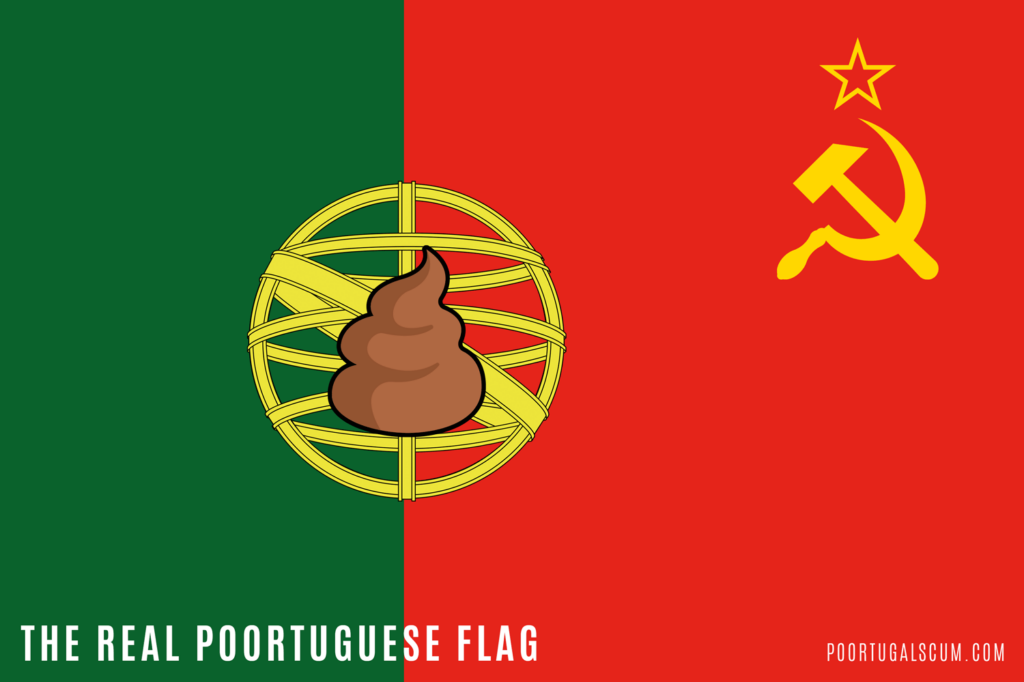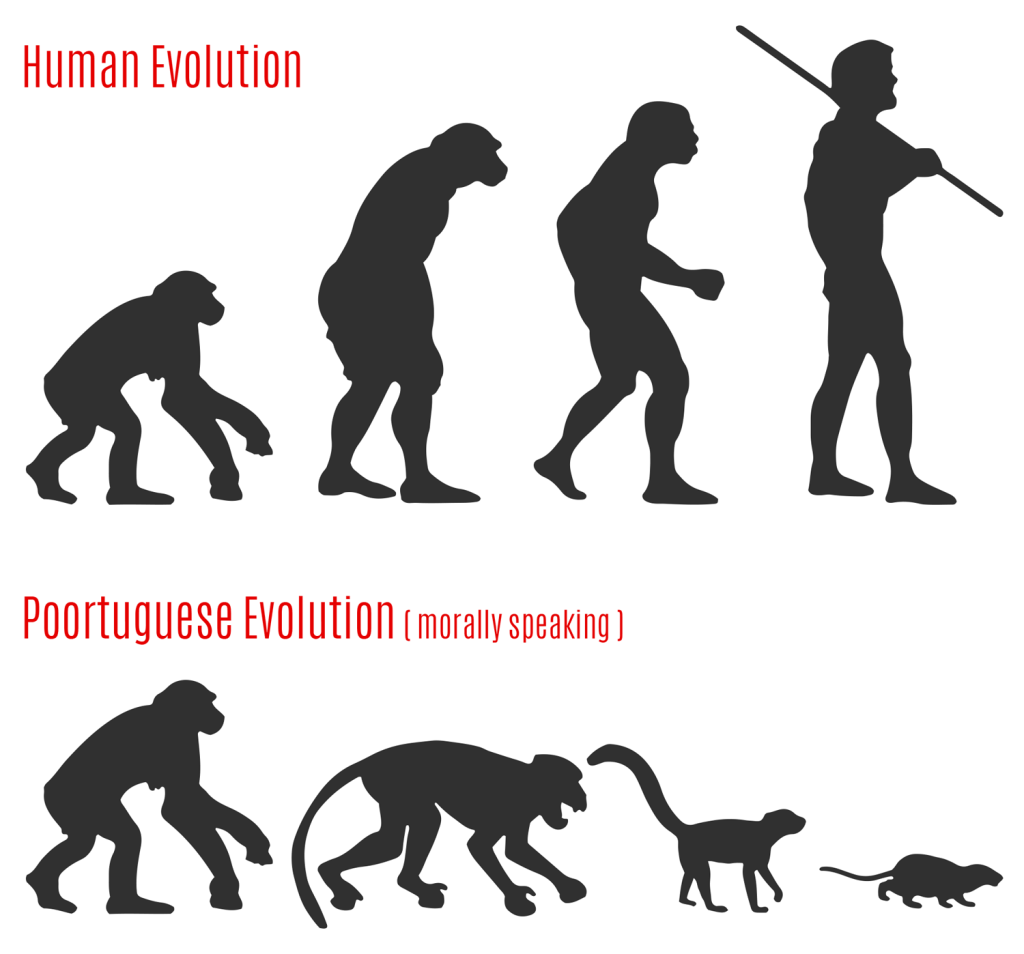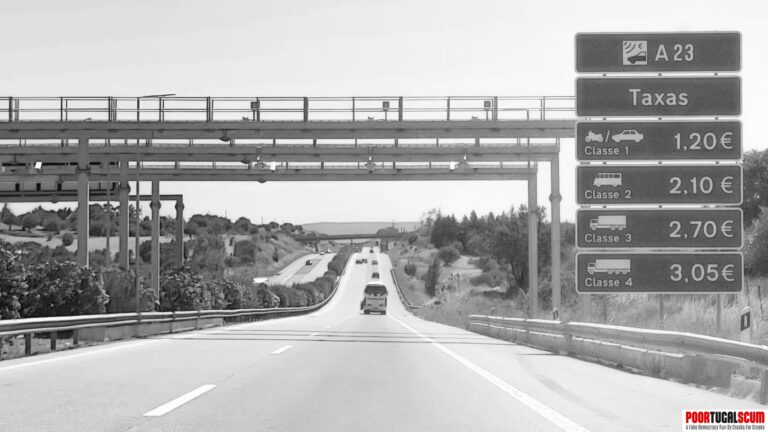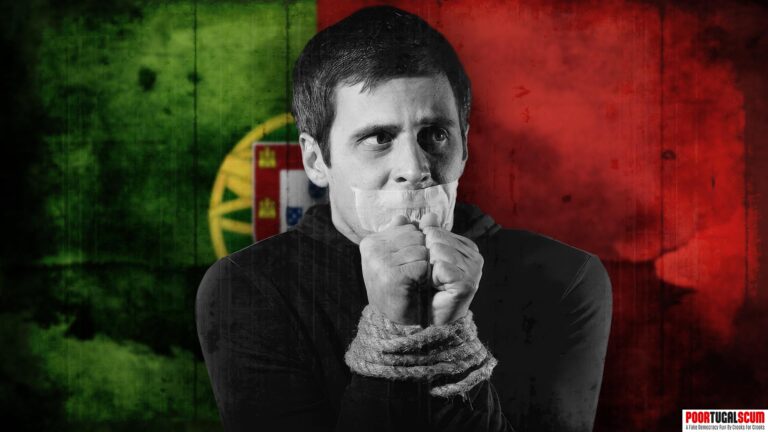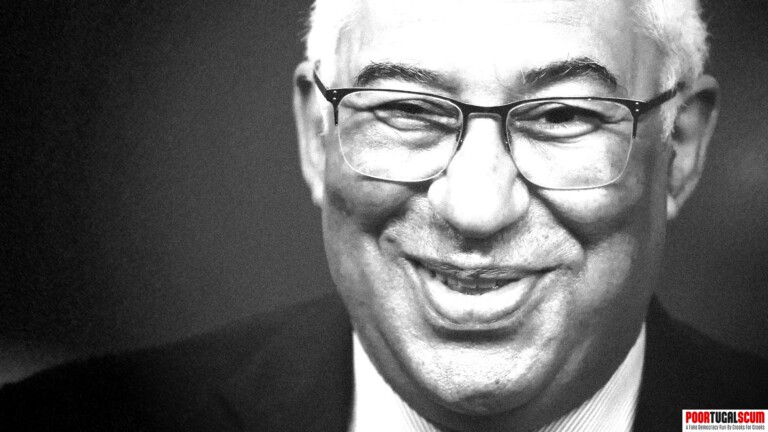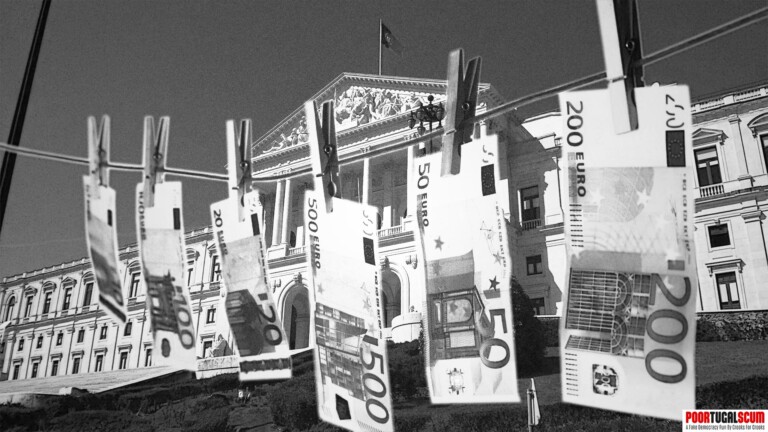It’s hard to write a preamble to this news, it makes my blood boil to see such human decay and further irrefutable proof that Portugal is indeed a dictatorship, as if there wasn’t enough blatant evidence already.
This woman, who probably (because in Portugal all evidence is systematically hidden, postponed, erased and literally destroyed) during her entire career systematically dismissed thousands of corruption cases (only the known ones) worth billions of euros that passed through her hands during almost 13 long years of raping democracy, especially when they involved her political friends, had the audacity to say that there is no corruption in Portugal and that there are no corrupt people in Portugal either, except residually (obviously only a corrupt person defends a corrupt person). And what is absolutely horrifying in the eyes of any citizen of a normal, democratic and developed country, is that this full-fledged corrupt puppet (who in any other country would be behind bars for life) was at the head of the most important anti-corruption department of the Portuguese Justice, a governmental body specially set up to investigate corruption and economic crimes with national impact and, imagine, the person in charge of monitoring these politicians is directly appointed by the same politicians he/she has to monitor (!!!) Sweet!
A shameless violation of democracy, practically a “legal” coup d’état!
If you think about it, it makes perfect sense, because we are talking about Portugal, the fraud, where everything is corrupt and fake to the core. In the end, a criminal mafia masquerading as a legitimate country.
Her whole conversation reveals in a very obvious way what her real intentions are and who she really is and defends, which is certainly not democracy and the Portuguese, as she so cynically tries to convey through some sly platitudes sentences that most Portuguese happily swallow, getting to the point of blaming the organization Transparency International, the nerve!
And this is Poortugal, the main judicial body that fights crime and corruption is in itself totally corrupt and was presided over by a puppet at the behest of her masters corrupt politicians and “friends”, as if we were talking about some banana republic, yet, indeed we are of course! Obviously, there is no separation of powers in Portugal, so there is no democracy either. So what is this “country” still doing in the EU?!
This woman speaks exactly like an official spokesperson for a dictatorship.
Obviously, this woman would never be allowed to be a judge, of any rank, in any democratic country, she’d probably be a portress, but in Poortugal she’s the boss of the bosses in the Portuguese judiciary, at least when it comes to investigating corruption.
However, since we are talking about Poortugal, this woman is no worse or better than other Portuguese people in general. She is just another rotten piece among the infinite others that exist in Portugal, ready to replace her.
It is worth noting that she was later promoted to the position of Judge Advocate at the Supreme Court of Portugal, earning an obscene salary, paid for by the taxpayers!
Note: In trying to find more revealing news (at great cost, because what comes up is usually very superficial and not usable or very suspiciously non-existent, even when we know what we are looking for). So, unfortunately this is only a very small but representative sample, but hopefully we can extrapolate the rest, very often I came across news from the Portuguese media that whitewash this corrupt (voluntarily or due to pure stupidity), portraying her as a person who is always very concerned about corruption. It really looks like propaganda from the former Soviet Union. You can see now, that this is how “democracy” works in Poortugal.
The following article is a translation (mostly MT). You can find the link to the original website at the end of it.
Deputy Attorney General Cândida Almeida said Saturday that “Portugal is not a corrupt country” and that there is an “exaggerated” perception of the scale of this crime, stressing that it is one of the few European states where “big state business” is investigated.
“Our country is not a corrupt country, our politicians are not corrupt politicians, our leaders are not corrupt leaders. Portugal is not a corrupt country.”
There is obviously corruption, but I reject any simplistic and generalized statement that the country is completely alien to rights, ethical behavior (…) that it is a country of corrupt people”, said the director of the Central Department of Investigation and Penal Action (DCIAP), at a conference at the PSD Summer University, in Castelo de Vide.
After insisting on this idea several times, the magistrate said that, however, this is not the “perception” of public opinion,
referring that the reports of the organization Transparency International Portugal and the media “destroy us permanently” with the idea that the country “is corrupt”.
Cândida Almeida underlined that, in the case of Transparency International, the reports “only reflect the perception” that there are two levels of corruption in a country and that, with regard to the media and public statements in that sense, most cases are unfounded or refer to other crimes, the most frequent being tax fraud.
“It happens that people, in general, without knowing exactly what they are saying, talk about corruption in a sociological, ethical-political concept eventually, but they talk about things that are not corruption, they talk about similar things”, he said, adding that “corruption has to do with citizens or officials who sell themselves or want to sell themselves”.
And she gave the example of Operação Furacão, which public opinion perceives as being related to corruption, when, in reality, it is about tax fraud.
The prosecutor insisted that “corruption is residual”,
although it has to be fought to be contained, underlining several times that it is and should be a “concern” of all democracies, because it undermines their structures and foundations.
According to the director of DCIAP, whenever someone “with credit” publicly refers to the existence of corruption, he is called to declare, never confirming the foundation of the statements, because they are based on rumors, revealing that, for example, the chairman of lawyers, Marinho Pinto, has already been heard in this context.
For Cândida Almeida, it is therefore necessary to combat this wrong and “worrying” perception: “Because we are left with the idea that, on the one hand, nobody does anything against corruption and, on the other, we are all corrupt”, he said.
The prosecutor said that in terms of “corruption” and the fight against this crime, “Portugal is in the European average” and is even one of the countries that goes further in the investigation of this type of offense, giving as an example the judicial process related to purchase of submarines by the Portuguese State.
“This is an exemplary case that is being dealt with at a European level, precisely because there are no restrictions, neither from the Public Prosecutor’s Office, nor from the sovereign bodies, from the Government, from anyone else. We have effectively done our job (…) stated.
Cândida Almeida said that she has been exchanging emails with “a colleague” in Germany for four years about the submarine case and documents that must be sent to Portugal and that never leave that country.
Regarding the fight against corruption, the prosecutor explained that
these are “difficult” investigations
because there is “a code of silence in this type of crime”, with no records of conversations or exchanges of messages. And when there is a complaint, usually “a lot of time” has passed, leaving the investigation dependent on documents that are often destroyed.
In this regard, Cândida Almeida lamented the frequent violation of the Secret of Justice, namely by the media, which “reveals the existence of processes and ends up making important documents disappear”.
More related news
“Portugal is not a corrupt country”
( … )
Cândida Almeida defended “one-off” legislative changes in the fight against corruption and said that there should be no “witch hunt” in these matters, in a response to a student from the PSD Summer University about José Sócrates.
( … )
A student at the PSD Summer University said she did not understand how people about whom there are “strong suspicions” are investigated and detained, even preventively, and that does not happen with the former prime minister, José Sócrates. This student said that Sócrates lives and studies in Paris, leading “a life of great luxury with the money from the salaries he earned in Portugal” and questioned whether the former prime minister will have any different protection.
In response, Cândida Almeida again referred to the inability of the Public Ministry to compare declarations of patrimony and real patrimony. “We are going to initiate the investigation on suspicion of what?”, she asked. “Today is this one, tomorrow is that one and then it’s a witch hunt
and we don’t want any republic of judges. We are magistrates, we owe compliance to the law, investigations follow the terms of the law, the terms of criminal procedure, there is not and cannot be any republic of judges”, she said.
“Imagine what the magistrates were now saying: I’m going to see that one’s account and now I’m going to see this one’s account… This also turns out to be a greater danger to democracy”, she reinforced.
The Deputy Attorney General also defended a change in the way in which judges of the Constitutional Court are elected, saying that “something is wrong” when their choice implies an understanding between political parties.
More related news
Cândida Almeida “surprised” by Socrates’ arrest
Prosecutor who investigated former prime minister in the Freeport case admits to never having found any evidence of corruption relating to the now accused in Operation Marquês
In an interview with Económico TV, released this Friday, the prosecutor reiterates that of the investigations she led and involving the name of José Sócrates,
no “evidence” was found for the attribution of crimes of corruption or money laundering.
These crimes are now imputed to the former prime minister under Operation Marquês.
The former director of the department that investigates the most complex criminality and economic crimes admits that she was “surprised” by the preventive detention of José Sócrates “because he was a former prime minister” and because in the investigations that she led before, “evidence of the crimes that are now imputed to him” were not detected. It is recalled that the prosecutor led the investigation into José Sócrates in the context of the Freeport case. And she was even removed from office by the current Attorney General of the Republic, Joana Marques Vidal, for alleged violation of the secrecy of Justice in this same investigation.
In an interview with the ETV program “Conversas com Vida”, Cândida Almeida defends herself against these insinuations made to her about alleged leaks of information. “I was very angry because it is the greatest injustice that can be done to me, I have always dedicated the greatest concern to the secrecy of justice because the magistrate is the most affected when it is violated”.
The magistrate had some of the most delicate corruption cases in her hands, having shelved the case of Sócrates’ degree and the alleged suspicions of corruption in the Freeport concession.
The prosecutor goes on to say that the investigations she led into Sócrates, then prime minister, did not leave “evidence” for the imputation of crimes of corruption or money laundering and refuses to comment on the way in which Sócrates was detained and the measure of coercion applied, “out of respect” for the work of the prosecutors involved.
Recognizing that the way in which the PGR removed her from the DCIAP “was not the most correct”, the prosecutor argues that she should have been the one to close some of the ongoing processes and denies that in 2014, with Amadeu Guerra at the head of the department, was the year in which Justice came to the powerful. “There may be that perception, but most processes have always been focused on the most powerful and what happened in 2014 was just the end of some processes”,
concludes Cândida Almeida, who says that she closes her career with a golden key: ” I leave with a clear conscience”.
More related news
Prosecutors with “lack of confidence” in Cândida Almeida
The prosecutors in charge of the Freeport process, Vítor Magalhães and Paes de Faria, revealed, in a joint meeting in The Hague with the English authorities, that they preferred not to have the director of DCIAP, Cândida Almeida, present. The SFO recorded everything.
In February 2009, the magistrates in charge of the Freeport case, Vítor Magalhães and Paes de Faria, suggested in a meeting in The Hague with the English authorities that there was a “lack of confidence in the hierarchy” of the Public Ministry, that is, in the director of the Central Investigation Department and Criminal Action, Cândida Almeida.
The information appears in the notes of the Englishmen who participated in the meeting, which DN had access to (see document above), and was confirmed by a source from the Eurojust college, the European body that organized the meeting between the Portuguese and the English.
In the document from the Serious Fraud Office (SFO), in the chapter “notes of the meeting”, it can be read that, “according to the Portuguese prosecutors (in confidence they told us that they had no confidence in the hierarchy, represented at the meeting by Mrs . Cândida Almeida), the inquiry should continue on the same basis. The inquiry concerns the possible involvement of Prime Minister José Sócrates in the Freeport case”. Further down, the English from the SFO also say:
“During this meeting on the corruption scheme it was clear to us that Mrs. [Cândida] Almeida was against the idea that the Portuguese Prime Minister could have received any bribe”.
Faced with this information, Vítor Magalhães refused to confirm it. “It is Cândida Almeida and Pinto Monteiro who have to maintain confidence [in him], since they are [his] hierarchical superiors, and not the other way around.”
However, the prosecutor confirms that he did not want the DCIAP director to be present at that same meeting, as DN also reported yesterday: “It is true that I have always defended, and I continue to affirm, that those who should have participated in the Hague meeting were Maria Alice Fernandes and Carla Gomes and not director Cândida Almeida. No one knew the case better than the Setúbal investigation team.”
According to a source from the Eurojust college, on the eve of the meeting, the magistrates in charge of the Freeport case, Vítor Magalhães and Paes de Faria, suggested to Lopes da Mota that Cândida Almeida not participate in the meeting, alleging “lack of confidence in the director of DCIAP and in Pinto Monteiro”.
The two magistrates defended the presence of Maria Alice Fernandes, claiming that the coordinator was the one who actually knew the process, but she had been removed from the meeting by decision of Cândida Almeida.
In the English notes to the Hague meeting, now in the hands of Richard Alderman, current director of the SFO, there is a description of the same meeting:
“It was a surrealist meeting. The Portuguese did not know about the case and were more concerned with defending and asserting the sovereignty of its magistrates.”
In the same document it can also be read that “the Portuguese magistrates are blocking the course of the investigations that the PJ intended” and that there was a great concern of Cândida Almeida with the fact that the investigation aimed at the possible involvement of the Portuguese Prime Minister.
The notes and the report made to the Home Office by the English envoys also reveal that the rogatory letter sent from Portugal “was fulfilled almost in its entirety”
but that on several occasions “the information sent to the Public Ministry in Montijo was returned” to its origin.
The DN learned from the Montijo Court that it was an employee “who did not speak English” who mistakenly returned the mail that arrived from England, although the possible explanation may lie in the fact that, between 2005 and 2008, by that court several prosecutors – more than three – without any specialization in the area of economic crime.
Part of the transcription of the notes that the English of the Serious Fraud Office made to the meeting in The Hague with the five Portuguese envoys: Cândida Almeida, Vítor Magalhães, Paes de Faria, Pedro do Carmo and Moreira da Silva. The meeting was also attended by Portuguese and English representatives at Eurojust, some of whom corroborated the content of the document to DN
More related news
English police suspect José Sócrates
The news of the last edition of VISÃO marked the informative agenda of Thursday. José Sócrates went public to say he was the victim of a “black campaign”
The small envelope contained a large bomb. On the 19th of January, an office of the Central Department of Investigation and Penal Action (DCIAP), on Avenida Alexandre Herculano, in Lisbon, received a rogatory letter sent by the English police.
That document explicitly states that Prime Minister José Sócrates is suspected of having “requested, received or facilitated payments” in the context of the process relating to the licensing of the Freeport project, in Alcochete.
The letter was sent by the Serious Fraud Office – the English Justice unit that investigates the most complex economic crime and which, since 2007, has been investigating alleged embezzlement related to the approval of the construction of that outlet. The researchers also point the finger at Manuel Pedro and Charles Smith – consultants hired by Freeport PLC to help carry out the steps leading to the project’s licensing – and, furthermore, four English officials linked to the promoting company, and two other Portuguese involved in the operation, which VISÃO found to be another Smith&Pedro employee and a technician from an organization in the field of the Environment.
With regard to all these protagonists, the English police say they have “reasonable grounds” to believe in “allegations of bribery and corruption”, a practice that, the letter concludes, is “in contravention of the laws of England and Wales ”. Contacted by VISÃO, the prime minister’s office declined to comment on the existence of this letter, which will remain attached to the file forever.
This demonstrates a clear desire, on the part of the British police, that their suspicions are duly recorded in the files, which already contain 12 volumes and more than 100 appendices.
The magistrates who read the document, and who have been conducting the investigation since September 2008, were stunned by the information coming from Her Majesty’s lands. This was not the first time that the English authorities had implicated José Sócrates. On 17 November, Cândida Almeida, director of the DCIAP, traveled to The Hague, accompanied by Pedro do Carmo, deputy director of the Judiciary Police (PJ) and Moreira da Silva, responsible for the PJ unit that investigates economic crime. A few elements of the English police were waiting for her for a meeting with a view to agreeing strategies regarding the outlet case.
It was at this time that the Portuguese authorities were confronted with the content of a DVD, which contains an audio recording of a conversation between a Freeport administrator and the intermediary Charles Smith.
In that dialogue, Smith allegedly confessed to corrupt payments, during the licensing phase of the undertaking, in 2002, with the name of José Sócrates
– who, at the time, was Minister of the Environment – being mentioned.
Cândida Almeida immediately turned her nose up at this exhibition, claiming that, under Portuguese law, that material would never be admitted to the process. For this, the recording of the conversation should have been authorized by a judge. The director of DCIAP also refused the creation of a mixed team, with the purpose of investigating the conduct of the Portuguese Prime Minister. Outraged, she even said that she would never admit the interference of a foreign police in an investigation of a head of government.
More related news
SIRESP case archived by the Public Prosecutor’s Office due to lack of evidence pointing to any wrongdoing
After nearly three years of investigation, the Public Prosecutor’s Office closed the investigation into the SIRESP case. The process comes to an end “because no evidence of any [criminal] offense has been found”, confirmed a judicial source to Lusa.
The investigation, which began in 2005, was triggered by suspicion of influence peddling and undue access to privileged information in the award of the Integrated System of Emergency and Security Networks of Portugal (SIRESP), involving various political figures, including two former ministers of the government of Santana Lopes.
Suspicions about the award of SIRESP arose after news from PÚBLICO reported that three days after the legislative elections, two ministers from the outgoing government of Pedro Santana Lopes awarded the €538 million deal to a consortium led by Sociedade Lusa de Business (SLN) – the only competitor. The order was signed by the then Ministers of Internal Administration, Daniel Sanches, and of Finance, Bagão Félix, after a favorable oral opinion by the current Vice-President General of the Republic, Gomes Dias, who at the time was the MAI’s legal auditor.
The process began with a preventive investigation, triggered by the coordinator of the Central Department of Investigation and Criminal Action, the deputy attorney general Cândida Almeida. The investigation would later lead to an inquiry led by the Deputy Attorney General Azevedo Maia, according to an indication by the then Attorney General of the Republic, Souto Moura.
At first, Bagão Félix refused to sign the joint dispatch with the MAI, for having understood “that the urgency that would make the decision of a government in management possible was not justified”. Gomes Dias’ opinion, realizing that “the adjudication could be made by a management government”, would make him change his mind.
In the set of information disclosed however, it became public that, before joining the government, Daniel Sanches was a director of Plêiade, a subholding of SLN, whose non-executive director was Dias Loureiro, one of Pedro Santana Lopes’ closest advisers.
Already during the investigation process, and according to Expresso on-line, the Instituto das Comunicações pointed out that the tender rules favor “the competitor(s) with access to privileged information”. The same technical opinion also stated that “the very short period given for the presentation of proposals [50 days, including the month of August], in a tender as complex as SIRESP, seems to have been the determining reason for the existence of a single proposal “.
During the course of the investigations, the Judiciary Police searched four of the five companies in the consortium, including the leader, SNL, chaired by the former Secretary of State for Tax Affairs de Cavaco Silva, Oliveira e Costa.
After the victory of the PS, in the 2005 legislative elections, the newly elected Minister of Internal Administration, António Costa, asked the Attorney General’s Office for an opinion, which considered the deal void, as it was negotiated with a government in current management. However, Costa did not fully annul the tender and ended up awarding SIRESP again to the same consortium, albeit at a lower price. From the initial 538 million, it went to 485.5 million.
Despite being awaited for years by the various security forces, SIRESP is still not working. PÚBLICO/Lusa
More related news
Cândida Almeida does not see a problem in the courtship of the attorney with the head of Inteli
The director of the DCIAP, Cândida Almeida, did not and does not see any problem with the fact that a prosecutor for the investigations of the submarines is the girlfriend of the president of the entity that carried out the expert examination of the compensation process and worked for the consortium that sold the ships.
(…)
Regarding the position of the deputy prosecutor in question, the director of DCIAP stated that she always carried out her duties with “professional and ethical rigor” and, at a time when the statement did not specify, “she felt the need to inform her hierarchy that she had started an affective and serious relationship with the chairman of Inteli’s board of directors”. She was told this was not a problem.
SIC reported that the relationship between Carla Dias and Felizardo began during the investigation phase of the compensation process, which is already in the instruction phase and has ten defendants.
More related news (cynic egregious brainwashing)
Cândida Almeida calls on the Portuguese to denounce cases of corruption
The director of DCIAP appealed to the Portuguese to denounce cases of corruption, stressing that the only ones affected are the State and citizens.
On the sidelines of the conference “Prosecutor’s Office and the Fight against Corruption”, promoted by the Central Department of Investigation and Penal Action (DCIAP), Cândida Almeida considered that the crime of corruption does not have direct victims, stressing that both those who corrupt and those who are corrupted have advantages in this action.
In this context, defended Cândida Almeida, the only ones affected are the State and the citizens, so the complaint must be reinforced.
“It is important to fight against the phenomenon of corruption, not only in the legal sense but also in the sociological concept and that encompasses a much broader criminal reality. One of the biggest problems facing the investigation of corruption is the lack of, apparently, concrete victims or witnesses who denounce the facts”, she warned.
In his speech, Cândida Almeida also announced that a manual of good practices for combating corruption will be presented this Wednesday, in order to guide investigators and citizens in reporting the crime.

